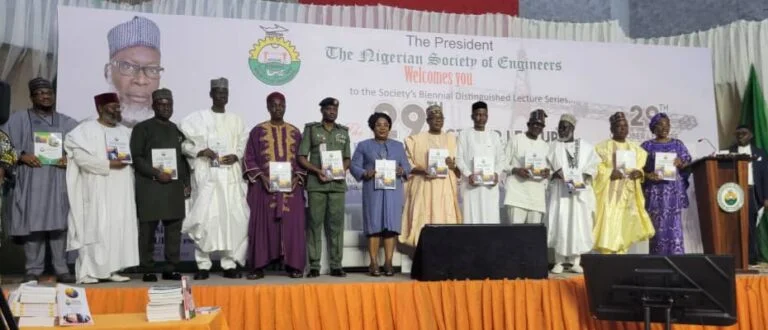The Nigerian Society of Engineers (NSE) has called for full adoption of state-led rural electrification programmes to accelerate access to electricity and reduce overreliance on the federal grid.
The call was made on Friday in Abuja during the society’s 29th October Lecture themed “Evaluating Nigeria’s Power Sector Reform 2005–2023: A Quantitative Analysis of Technical Performance and Regulatory Impact.”
Mr Tasiu Gidari-Wudil, former NSE President (2022–2023), who delivered the lecture, said the 2023 Electricity Act created new opportunities for states to address their electricity needs directly.
“I am advocating for state rural electrification programmes across all 36 states and the FCT, in addition to the Nigerian Electricity Commission. In the U.S., every state has a public utilities commission, while the Federal Energy Regulatory Commission manages interstate businesses and large hydro plants. Beyond that, even small villages can form cooperatives to generate electricity for themselves with the resources they have. That is the model we should adopt,” he said.
According to him, inadequate electricity remained one of the most critical infrastructure challenges confronting Nigeria and Sub-Saharan Africa.
While acknowledging progress made through reforms, such as increased private sector participation, stronger regulatory frameworks and expanded installed capacity, Gidari-Wudil noted that Nigeria was still far from achieving reliable and affordable power.
He cited systemic challenges including political interference in tariff setting, inadequate infrastructure, and financial unsustainability. He added that power shortages caused annual economic losses of about $50 billion, forcing manufacturers to depend on diesel generators and undermining industrial competitiveness.
He said consumer satisfaction remained low, with over half of Nigerians believing they had not benefitted directly from reforms.
“Tariff reforms like the Service-Based Tariff have improved revenue but not necessarily service delivery, as monitoring remains weak,” he said.
Looking ahead, he stressed the need for reform models adapted to local realities, strengthened regulatory capacity, transparent subsidies, and active stakeholder engagement at community level.
He urged government and stakeholders to remain committed to electricity reforms, saying, “If we want electricity, we have to do the right thing.”
Dr Kola Adesina, Group Managing Director of Sahara Power Group and Special Guest of Honour, emphasised that private sector investment remained crucial for the power sector.
Represented by Godwin Emmanuel, Head of Generation at Sahara Power Group, Adesina said, “The reforms of yesterday must therefore evolve into the reforms of tomorrow. They must be reforms that inspire investor confidence, encourage technological adoption and ultimately serve the Nigerian people.”
He added that the task before stakeholders was to deepen and accelerate reforms with technical precision, regulatory courage and strong political will.
“We will continue to invest, innovate and collaborate because we believe that Nigeria’s future is bright and that with collective effort, indeed, there will be light,” he said.
Mrs Margaret Oguntala, NSE President and Chairman-in-Council, noted that the lecture’s theme resonated with national discussions on sustainable electricity, energy transition and sector efficiency.
She explained that the October Lecture served as a strategic platform for NSE to articulate positions on critical national issues.
“Most importantly, it is to showcase the knowledge, wisdom and the professional expertise of our revered past presidents, whose leadership and contributions continue to inspire generations of engineers. This gathering brings together thought leaders, policy makers, industry experts and professionals for impactful dialogue on issues that shape our national future,” she said.
She reaffirmed NSE’s commitment to promoting engineering excellence, upholding ethical standards and contributing meaningfully to nation building.
(NAN)


